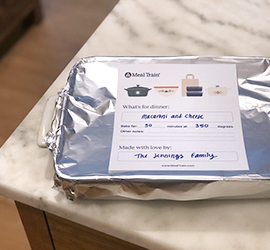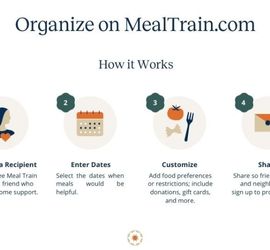The first three trimesters of pregnancy are filled with preparation and anticipation. Parents-to-be pay careful attention to their health and well-being. They attend classes, transform nurseries, and more. So much emphasis is placed on the first three trimesters that it’s easy to forget about the fourth.
The fourth trimester is the 12-week period immediately following the birth of a child. It’s a crucial time when the mother’s body readjusts to no longer being pregnant, and the baby continues to develop outside the womb. Because of so many changes – physical, hormonal, and emotional to name a few – the fourth trimester can be overwhelming for everyone.
If you’re currently pregnant, here’s how you can prepare for that fourth trimester and the many challenges that arise.
Set up a Meal Train® page
Have you ever heard the saying, “It takes a village to raise a child”? Well, this is the village getting started early. Setting up a Meal Train page is a gift for new parents. While you’re acclimating to your new routine, others can make and deliver meals so you can sleep, change a diaper, take a walk, or put your feet up. A Meal Train page allows your friends and family to support and nourish you during this time, so you can focus on nourishing your little one.
Take it easy
Birth can be traumatic for your body, and it takes time to heal. Sleep when you can! Any time you can sneak in some rest your body and mind will thank you. Light exercise like a walk with your new bundle can be helpful for your recovery. You’ll not only get fresh air, but you’ll get some endorphins pumping, which can help you feel happier, more confident, rejuvenated, and refreshed.
Limit visitors
Get ready for dozens of friends and family reaching out to ask when they can see the baby. While they mean well, this can add stress and become overwhelming. Many moms feel as though they need to put on a brave face and “host” company when they really want to sleep or snuggle with their newborn privately. Put boundaries in place and limit visitors so you can rest and relax until you’re feeling more ready for company.
Schedule a mental health check
According to the CDC, roughly 1 in 8 women experience the symptoms of postpartum depression in the United States. There are many symptoms of PPD, including severe anxiety and trouble with sleep or appetite.
Most of the time, women who are experiencing these symptoms are afraid to reach out or aren’t sure where to go for help when they really need it. Do yourself a favor and check in with a friend or family member after giving birth. Having someone who knows you well and can recognize changes and look out for you during this time can really make a difference.
Be kind to yourself
During this transition period, you likely won’t have it all figured out the first week. It’s OK. Each new parent adjusts differently. Consider treating yourself during these months in a way you may not normally. For example, hire a cleaning service, get a massage, or simply allow yourself some peace and quiet. You’ll be amazed at what feels like a luxury once the baby comes. Caring for yourself can help you keep your sanity.
Final Thoughts
Remember the fourth trimester is just as important as the first three. These ideas can help you navigate those weeks after giving birth so you can dedicate your time and energy to your new human and new normal.





















































